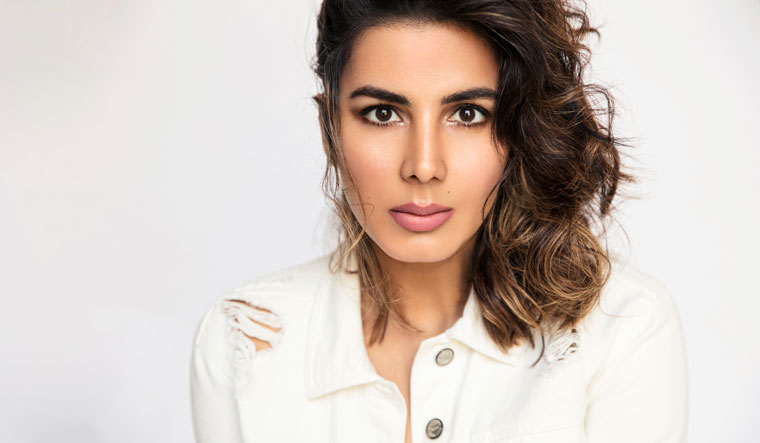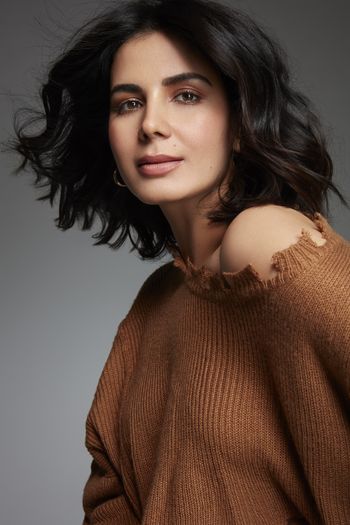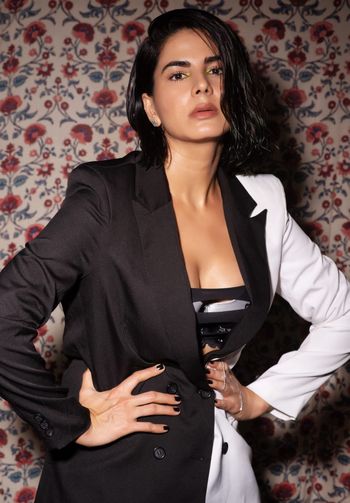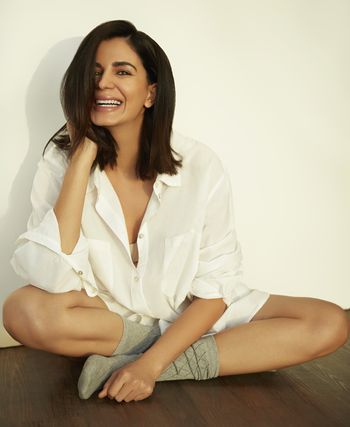With the clouds of lockdown not clearing up, actor Kirti Kulhari feels a little unsettled as she misses the busyness synonymous with being an actor. Though it may still take some time for things to get back in order, the comfort at the moment is in the recent success of the second season of Four More Shots Please! (FMSP). Revolving around four Mumbai girls, one of them being Kulhari’s character Anjana Menon, the second season of the Amazon Prime Video series that started streaming in April, has stood out on many fronts. The show did get a large chunk of criticism for going beyond the convention and making the girls too wild. However, it was applauded for breaking taboos, creating uninhibited female characters who don’t shy away from exploring sex and alcohol, and, more importantly, for giving women a more-than-equal representation on-screen as well as off-screen (the creator, writer, director are all women).
After spending some time at her parents’ place in Kharghar, Kulhari is back in her Goregaon house, where she lives with her model-actor husband Saahil Sehgal. There is a small wooden hut-like structure in the housing complex which she finds very peaceful. She sits there during our conversation as this is part of her daily evening routine during the lockdown. She knew that FMSP Season 2 is going to work well. “I have a sense of what is going to work. The previous season was great, no doubt about that. But for the second season, I knew that it was going to be better than last year when we read the script and, also, by the way we were shooting and going about it,” she says, not taking away from the fact that the current situation, of people being locked up in their houses, may have played a part, too. “It added new loyalty to the show. There are a couple of people who ended up watching just season two by itself. The lockdown, of course, helped. But, I think season two worked better. Also, in season one, the characters were still being established,” she says, adding that the familiarity of the audience with the characters may have helped as well.
Anjana is one of the two characters Kulhari credits for changing her career graph; the first being her intrepid portrayal of Falak Ali in Pink. Both the characters are unflinching, confident women in different scenarios. And, expectedly, both have led to some sort of discourse in their own way. In 2016, when Pink released and grew on word-of-mouth publicity, making ‘no means no’ a part of the popular discussion, the character of Falak Ali stood out for taking a stand.
In the case of FMSP, Kulhari is both ‘amazed and amused’ by the reactions she got from the public to the character of Anjana—a divorced, single mother who has her head set on excelling as a corporate lawyer even if she has to stand up for biases at work every now and then. At the same time, her headstrong character is not hesitant to dump a boyfriend because she has a commitment phobia. It doesn’t stop there, though. Anjana is not even wary of starting an affair with a married man who convinces her that he has an open marriage, and then not silly to not accept that she faltered. Anjana is flawed and real.
“Sometimes, people take your characters so personally. There are fans writing to me and comparing my other work with FMSP. They are telling me that I should not do shows like this. There are some hating me for dumping Arjun (Ankur Rathee). There are others who are telling me how Shashank (Sameer Kochhar) and I had great on-screen chemistry. And then, some are wondering about that bit of ‘sleeping around with men’ and are inquisitive if I am like that in real life as well,” she says.
Kulhari is amused at the fact that the audience start connecting to characters like it is real. “They form an image of you. Every time you break that image, it is like you are breaking an idea in their head and most people are not comfortable with that,” she says, as she strikes a parallel with real life. “Parents are so used to seeing their child a certain way. When the child does something out of the box, parents find it difficult to just take it. We all as a society, as humans, are so used to putting everybody in boxes that we tend to see them in a certain way. The moment it changes its course, we just don’t know how to handle it.”
As for Kulhari, she loves breaking the mould, the idea of sticking to one image, both on- and off-screen. “I love doing it. There is a sadistic pleasure that I have started deriving out of breaking people’s idea of who I am on-screen. I have also started doing it off-screen. It just feels so good. As public figures, you start taking the burden of how people see you, how they want to see you and, also, what they are comfortable seeing you as. You start taking that burden unknowingly. And this results in you defining who you should be,” she says. Step by step, she is breaking stereotypes with something as simple as encouraging ‘simple living’. Her posts on Instagram are a testament to that. Photos of a simple plate of dal-roti-sabji as a meal or just a regular mud-pack for her skin care breaks the idea that celebrities always indulge in ‘fancy’ things. She enjoys the comments on each of these posts, where people wonder if a celebrity life could be so regular.
It took her time to embrace social media and put out things she wanted to talk about. “There was a time when I was really anti-social media. I thought I don’t know how to do this, what to post or what to talk about. I really had no interest in being out there, except for showing my work as an actor. There was no other interest,” she says. Then, last year, for some random reason, she got back to social media and ‘it just organically started happening.’ “I started talking about things that matter to me without comparing my account to somebody else, or without trying to imitate somebody else, or without trying to be about what is trending in the world,” says the 37-year-old actor.
Interestingly, her life has been full of such epiphanies. She remembers a time when she was six or seven, growing up in Thane. Her mother was a homemaker and her father was with the Navy. She was a shy and reserved child who often made excuses to skip school and used to come back home in the middle of classes on some pretext or other, worrying her parents and teachers alike. But tables turned when she was in Class III. Although she does not recall the exact moment when it happened, she distinctly remembers that it started with playing badminton. “It was like a butterfly came out of her cocoon,” she recalls. Her inhibitions were shed and there was no looking back from that point. She was the front-runner in every extra-curricular activity. “For me, the transition from being a reserved child to becoming an all-rounder is one of my favourite periods from my childhood. So much changed in me during that time. I think this period is the reason why I became an artiste. I think that is when it all started.”
Just when it all seemed to go well, her father got a transfer to Visakhapatnam; she was in Class VI at the time. The new crowd was unaware of her achievements and this impacted her in a way she never anticipated. “Suddenly, I was not the most popular kid,” she says. Kulhari had to start afresh and prove herself all over again. “In the process of trying to fit in, I started becoming this person who would frequently gossip and bitch about people.”
It was an undiscovered aspect of her personality that was coming out. It prevailed until her elder sister, who is now a doctor in the Army, called her out. “Why do you bitch so much?” she asked Kulhari. “I was getting into my teens and I had lost some connection with myself. I was busy going very outward for validation, for respect....” Surely, it was all a part of growing up and being a teenager, but Kulhari feels it is a part of her life that she wants to weed out.
The epiphanies continued to play their role even later. The family was back in Mumbai in six years. But the acting dreams were yet to take shape. It was not an idea she had harboured, as she always thought that one has to be really pretty to be an actor or a ‘heroine’. She did not even have the self-esteem that would stimulate her to pursue acting. But, in college, while doing an activity for the Navy, All India Radio heard her voice. She was called for a project. It turned out to be a Films Division project—a women-centric Odiya film, Dharini (2002)—in which she got a role. She even skipped a semester for the shoot. The film never saw the light of day, but the experience awakened her desire to act.
After finishing college in 2007, she sought permission from her parents to pursue acting seriously. She did not want to live with regrets. Fortunately, her parents were supportive, but the journey was not a cakewalk. The initial few years were spent getting to know the industry, doing TV commercials and preparing herself with theatre and other acting workshops. She started off her journey with actor Neeraj Kabi’s theatre group, and later moved on to others, acquiring new skills along the way. As tedious as it sounds, Kulhari says she wouldn’t have asked for any other way to fulfil her dreams.
There were films like Khichdi: The Film that fetched her some recognition, but was soon forgotten. Or, as she puts it, “It did not translate into something substantial for Bollywood to take notice of me.” Then, Shaitaan (2011) released and she got Bollywood’s attention. But, even that did not last long. “I don’t know why. Maybe, I wasn’t at the right place at the right time, or not doing enough PR. I missed out on the opportunities that Shaitaan could have brought.”
In an introspective moment, she says, she could have become a typical ‘Bollywood heroine’ after Shaitaan. Instead, she chose Jal (2014)—an art-house film set in the Rann of Kutch that highlights the issue of water scarcity. “I play a Kutchi girl in the film; an unglamorous role. I took up the role because I was very serious about acting,” she says.
The film had a successful festival run, but like most films in the art-house space, it went unnoticed. But things changed with the release of Pink; it put her in the spotlight. She bagged a lead role, heavy-lifting Madhur Bhandarkar’s Indu Sarkar on her shoulders. She sparkled, but the film tanked. But by now, Kulhari had made her mark as the actor who brought her years of experience in her craft. “It has been a difficult journey, but I don’t know anybody whose life that has been easy,” she says, quickly adding that it may sound clichéd but it is true that, “everybody goes through their share of difficulties”.
But as they say, ‘every cloud has a silver lining’. And Kulhari saw hers in 2019. She played a small but significant role (flight lieutenant Seerat Kaur) in Uri: The Surgical Strike, followed by FMSP’s first season, then the scientist Neha Siddiqui in Mission Mangal, and a Balochi woman, Jannat Marri, in Bard of Blood (Netflix). If not for the pandemic that has left us locked in our houses, 2020 would have only been better with the success of FMSP’s second season and the release of the Indian remake of The Girl On The Train. But everyone is clinging to hope of a better future and so is Kulhari, who is now raring to get back to shoot as soon as the virus makes an exit. n
At a glance
What are the languages you speak?
Hindi, English, Marathi, Bengali, Rajasthani, Gujarati.
What is on your reading list?
I am reading Close to the Bone by Lisa Ray, her autobiography. I am also reading A Thousand Seeds of Joy: Teachings of Lakshmi and Saraswati by Ananda Karunesh and The Bastard of Istanbul by Elif Shafak.
Your favourite sport.
Badminton.
What about sportsperson?
I love Roger Federer and Rafael Nadal.
A board game that you enjoy playing.
I enjoy pictionary.
Roles that changed your career graph.
Falak Ali in Pink and Anjana Menon in Four More Shots Please!
One role you regret turning down.
There is one that I was offered (Ram Prasad Ki Tehrvi). It was written and directed by Seema Pahwa ji. I think Konkana (Sen Sharma) played the role that I was offered. I have not seen the film yet, but I regret not taking it up.
Which decade do you think is the best in terms of movies made and why?
I think the last 10 years have been pretty good for sure. I also enjoy the black and white era; I don’t know what decade, but the 40s and also the 50s were absolutely lovely.
One big change that you want in the entertainment industry.
I want the whole hierarchy system to disappear. I want people to be treated equally; I want everyone and the unit to be treated equally—whether an actor has a five-minute role, two hours, or more. I think people just need to be more inclusive and treat others as their equal.
Is there a director you are dying to work with?
If you talk about Indian directors, I want to work with Zoya Akhtar, Vikramaditya Motwane and Shakun Batra. I would also love to work with Mahesh Mathai.
What about actors?
I would love to work with Ranbir Kapoor. I have always wanted to work with him. I think he is a wonderful actor. I think I want to do something with Vicky again [after Uri: The Surgical Strike]; Rajkummar Rao, too. I would love to work with Vidya (Balan) again; also Vikrant Massey.
A song that you can’t stop singing.
‘Kaise Hua’ from Kabir Singh and ‘Nit Khair Manga’.
Who is the first person you call when you want to deliver some news?
I think I would call my husband and my parents.
The funniest thing you have read about yourself.
Some people have commented on my picture saying that I look like Michael Jackson. I am still trying to figure out how and from which angle. I was like… “Ok, what does that mean?” I have a very sharp nose and, of course, Michael Jackson had what he had. But it really amazes me. The first time I read it, I was like “what (laughs out loud)?” If you do see a similarity, please let me know.
What inspires you the most?
I think the more I am understanding life, the more I am understanding myself. I get very excited about every day, about learning something new and discovering myself. That is what really inspires me.
The most inspiring people around you.
I have learned a lot from my husband Saahil Sehgal. I have spent the maximum time with him and got to learn so much from him. There are times when people who you thought you know surprises you with something they say or do. It is amazing. I look forward to being inspired by everyone. If you talk about acting, I love Meryl Streep. She is one person in the world who really inspires me to be a good actor.
One memorable vacation.
I went to South America early this year to see the Amazon jungles and I was there for a week. That one week I spent there taking Ayahuasca (a psychoactive brew) has been the most memorable ever.
What is the most fulfilling thing in your life?
Being the actor that I am and also just being on this journey of self-discovery.
How did you meet your husband?
We met during an advertisement shoot for Nivea in 2008.
What was that moment when you decided that he could be your life partner?
It was in 2014. We were not in touch for about five-six years. We met again at an audition in 2014 and after that, we started dating pretty quickly. Within two months, we were engaged. We were at his house in Visakhapatnam and there was this moment when I was like “So, where do you want to take this?” And he asked, “Are you proposing to me?” To which, I said, “Get down on your knees and say what you need to say.” That was the time when we both decided.
A suggestion you would give to your younger self?
Love yourself. Learn to love yourself first.
The one thing you look forward to after everything gets back to normal?
Shooting and travelling.
What has been your quarantine fitness regimen?
I have been working out every single day. I work out in the morning and I happen to have some weights at home so I do weights and I also practise yoga. I work out for three days and then I take a break for a day and then three days again. I have been very good with my workout and diet.
What do you eat on a typical day?
My diet is very simple. I cook most of it and it is mostly Indian. So, I am a very daal-roti-sabji kind of person. I love eggs as well. So, breakfast is always eggs with some toast or milk. Then, in the afternoon and evening, it is roti-sabji. Nothing fancy. I don’t know how to cook fancy first of all, but I personally also just enjoy nothing more than healthy ghar-ka-khana.






